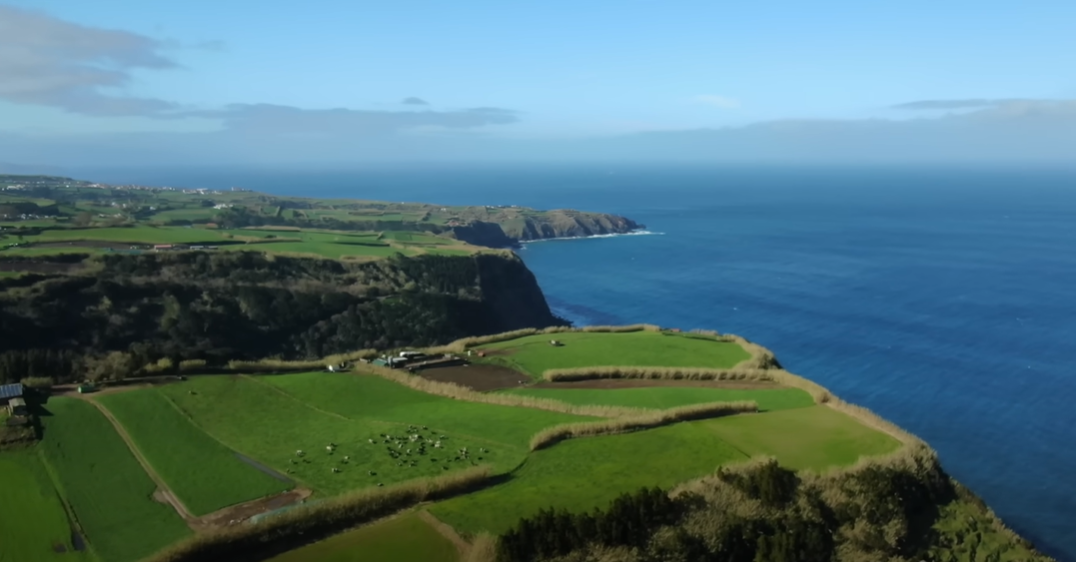Yes, the Azores is safe to visit. Azores is known for its low crime rate and welcoming atmosphere. The main concerns for visitors are related to natural factors rather than crime—things like unpredictable weather and the rugged terrain, which can be challenging if you're not prepared.
However, as with any travel destination, it's wise to take common-sense precautions such as securing your belongings, staying aware of your surroundings, and following local safety advice, especially when engaging in outdoor activities like hiking or swimming. Weather conditions can change rapidly, and the sea can be dangerous, so paying attention to weather alerts and heeding local advice about trail and water safety is important.

I visited the Azores last year and felt very safe throughout my trip. The locals were helpful and the paths well-marked. My experience in the Azores was safe and memorable.
Is Azores Portugal Safe at Night?

Yes, the Azores in Portugal are generally safe to visit at night. The islands are well-regarded for their low crime rate and the serene atmosphere they maintain after dark. Visitors typically report feeling secure when participating in nighttime activities, from dining in local restaurants to strolling along the coastal promenades.
During my numerous stays in the Azores, particularly in towns like Ponta Delgada and Angra do Heroísmo, I have consistently felt safe wandering around after nightfall and even while whale watching. The streets are well-lit and often populated with both locals and tourists enjoying the evening. I have personally walked back to my accommodations late at night without any disturbances, feeling as secure as I would in my hometown.
Basic Safety Analysis:
-
Crime Rates: Statistics show that the crime rate in the Azores is considerably lower than many European destinations and North American cities. Serious crimes, such as assault or robbery, are particularly rare, which contributes to the islands’ reputation as a safe destination.
-
Police Presence: Local law enforcement maintains a noticeable presence in busier areas and tourist hotspots, providing an added layer of security and quick assistance if needed.
-
Local Community: The close-knit communities on the islands foster a safe environment. Residents tend to look out for one another and are generally welcoming and protective of visitors.
Best Practices for being safe:
-
Travel in Groups: While solo travel is generally safe, walking in groups at night is recommended, as there is safety in numbers.
-
Keep Valuables Secure: As in any travel destination, it’s wise to avoid flashing expensive items and to use hotel safes for storing valuables.
-
Stay Informed: Regularly check with local tourism offices or your accommodation hosts for any specific advice or updates on safety in the area.
Local Insights:
-
Local Events: Participating in local events can be particularly rewarding. These events are well-organized with safety measures in place, offering a chance to experience the islands' culture safely at night.
-
Transport Safety: Public transportation and taxis are reliable and safe to use during the night. Drivers are usually locals who know the area well and can provide helpful tips.
Is Azores Safe for Solo Travelers?
Yes, the Azores is safe for solo travelers. The region boasts a low crime rate and a friendly local population, making it a secure destination for those journeying alone. When I visited the Azores by myself, I felt at ease walking through its towns and villages at any time of day.
Local authorities are approachable and helpful, offering peace of mind to tourists exploring the area. On my trip, I found that residents were eager to assist with directions and recommendations, which enhanced my overall sense of safety. Additionally, the natural environment of the Azores, from its lush landscapes to its serene beaches, is overwhelmingly welcoming.
It's important to take usual travel precautions, such as guarding personal belongings and staying aware of your surroundings. During my hikes around the volcanic lakes and mountain trails, I always made sure to have a map and sufficient water. Solo travelers should also inform someone of their plans, especially when embarking on outdoor adventures.
Are the Azores Safe for Solo Female Travelers?
Yes, the Azores are safe for solo female travelers. In my travels there, I consistently felt secure and welcome. The islands such as São Miguel island, Terceira island, and Pico island are known for their low crime rates and friendly local population, which contributes to a reassuring environment for visitors.
Crime is minimal, and most visits are trouble-free. I walked through various towns and villages at different times of the day without ever feeling uneasy. However, standard safety precautions are advisable, just as they would be anywhere else. For instance, it's wise to avoid unlit or secluded areas at night and to keep personal belongings secure.
The locals are helpful and respectful, often going out of their way to assist with directions or recommendations. During my stay, interactions were pleasant, and I received good advice on safe places and hot springs to explore. This welcoming atmosphere makes it easier for solo travelers to navigate the islands confidently.
Transportation around the islands is reliable and safe. I used both public transport and rental services like rental car without any issues. Drivers are generally cautious and roads well-maintained, although some rural paths can be narrow and winding. So overall, it's safe and convenient for female solo travelers to visit the Azores, which means you can take direct flights whenever you feel is the best time to visit the Azores.
Is It Safe to Travel By Public Transport In Azores?
Yes, it is safe to travel by public transport in the Azores. The crime rate is notably low, and incidents involving tourists are rare. The buses and taxis are reliable and well-maintained. During my visits, I regularly used public buses to traverse between towns and found them not only safe but also quite punctual.
The drivers are typically friendly and helpful, often willing to guide tourists about stops and routes. I felt secure at all times, even when traveling late in the evening. However, it's always wise to stay alert and keep an eye on personal belongings, as is advisable in any travel setting. Also check hotel rooms thoroughly for any hidden cameras after checking -in.
Additionally, public transport in the Azores is a cost-effective way to see the islands. It connects major tourist spots and local areas, offering a real insight into the local way of life. From my experience, it's not just safe but also an enriching way to explore the scenic beauty and cultural richness of the Azores.
What are the Crime Rate Statistics in the Azores Portugal?
The Azores, a tranquil archipelago belonging to mainland Portugal, is distinguished by its remarkably low crime rates, positioning it as a secure haven for travelers. My experiences on the islands have consistently affirmed their reputation for safety, where the serene environment is matched by the congeniality and trustworthiness of its residents.
Crime Statistics in the Azores
Crime rates in the Azores are significantly lower than both the Portuguese mainland and many other tourist destinations worldwide. For instance, the reported incidents of violent crime are nearly negligible. Official data indicate that major crimes such as assault or robbery are exceedingly rare, with rates as low as 0.5 incidents per 10,000 inhabitants annually.
Petty crime, while slightly more common, remains low compared to urban areas in mainland Europe. Theft or pickpocketing incidents typically occur at less than 10 cases per 10,000 inhabitants per year. These incidents are often opportunistic, occurring in areas with higher tourist foot traffic, and can usually be avoided with standard precautions.
Analyzing the Safety of Tourist Areas
Tourist areas in the Azores are particularly well-patrolled and maintain a very low crime rate. During my visits, the visible presence of local police in tourist hotspots reinforced a sense of security. The police also engage in community policing efforts, which helps maintain the islands' reputation for safety and community.
Effectiveness of Local Law Enforcement
The effectiveness of local law enforcement is evident not only in the low crime rates but also in their approach to maintaining order and safety. The local police force is well-integrated into the community, which enhances their ability to manage and prevent crime effectively. For example, during one of my stays, a briefcase left inadvertently in a public park was returned within hours, thanks to the efficient coordination between the local residents and the police.
Comparison with Other Regions
Comparatively, the Azores have a crime rate that is much lower than many other island destinations. For instance, while regions like the Caribbean or certain parts of Southeast Asia report moderate to high rates of tourist-targeted crimes, the Azores remain an outlier with their exceptionally low crime figures.
Impact of Low Crime Rates on Tourism
The low crime rates in the Azores significantly enhance the tourist experience on nine islands, offering an environment where visitors can relax and explore without undue concern for personal safety. This aspect is a significant selling point in promotional materials and travel reviews, attracting those who prioritize safety in their travel choices.
Reflecting on my time in the Azores, the blend of natural beauty, low crime rates, and the welcoming nature of the community makes it a uniquely secure and enjoyable travel destination. My experiences are testimony to the islands' commitment to safety and hospitality, making them a top choice for anyone seeking a peaceful and secure vacation spot.
Is the Water Safe To Drink in the Azores?

Yes, the water in the Azores is generally safe to drink. In my travels across the Azores, I consistently found that the tap water meets European Union drinking water standards, which assure its safety and quality. The local water supply undergoes rigorous testing to ensure it is free of harmful contaminants.
Is Bottled Water Necessary?
It is not necessary to rely on bottled water in the Azores. Tap water is not only safe but also tastes fresh, largely due to the natural filtration through the volcanic rocks of the islands. However, visitors who prefer bottled water will find it widely available in stores and restaurants.
What About Water in Rural Areas?
In more remote or rural areas of the Azores, I noticed that locals sometimes prefer using spring or well water. While generally safe, these sources are less regulated. If you are hiking or visiting secluded parts of the coast of the islands, carrying bottled water or a portable filter can be a prudent choice, mainly for peace of mind.
Tips for Staying Hydrated
Staying hydrated is crucial to maintain body fluids, especially if you are engaging in outdoor activities like hiking or exploring the natural landscapes of the Azores. So make sure to include these tips to stay hydrated.
-
trust the Tap Water: The tap water in the Azores is safe to drink. It meets the stringent safety standards set by the European Union, ensuring it is free from harmful bacteria and chemicals.
-
Consider the Environment: By using tap water, you can help reduce plastic waste associated with bottled water. The Azores are known for their pristine natural environments, and minimizing plastic use contributes to their conservation.
-
Carry a Reusable Water Bottle: Equip yourself with a durable, reusable water bottle. This makes it easy to stay hydrated throughout the day, and you can refill it at any tap or public water fountain.
-
Use Bottled Water Sparingly: While tap water is safe, if you have a sensitive stomach or prefer bottled water, it is readily available. Opt for large containers to lessen environmental impact.
-
Be Cautious in Remote Areas: In remote or rural areas, the water source might differ. If you're unsure about the water quality, use bottled water or a portable water filter as a precaution.
-
Check with Locals or Hosts: If you're staying in a guesthouse or rural accommodation, ask your hosts about the water quality. They can provide updates on whether the tap water is drinkable or if you should take extra precautions.
Tips for Staying Safe in the Azores
The Azores are generally safe to visit but still is a remote location, offering visitors a peaceful environment and low crime rates. However, like any travel destination, it's wise to observe certain precautions to ensure a safe trip. Here are some personal tips based on my experiences and thorough research:
Stay Informed About the Weather
The weather in the Azores can be unpredictable, with sudden changes that could impact outdoor activities. Always check the local weather forecast before heading out for up to date information, especially if you plan to hike or engage in water sports. I make it a point to consult reliable local weather services each morning.
Respect Natural Surroundings
The Azores boast stunning natural landscapes, from volcanic craters to lush forests. While exploring these beautiful sites, it's crucial to stick to marked trails and respect safety barriers. I learned firsthand when I strayed slightly off a marked path in Furnas and ended up slipping on loose soil. The incident was minor, but it taught me the importance of adhering to posted signs and guidelines.
Be Cautious on the Roads
Driving in the Azores can be challenging due to narrow, winding roads, and occasionally steep terrain. If you're renting a car, ensure you're comfortable with manual transmissions and always drive cautiously. During my drives across São Miguel, I always kept to a moderate speed to navigate unfamiliar roads safely. Also it'd be beneficial for you to get an international driving permit.
Practice Water Safety
The Azores are surrounded by the vast Atlantic Ocean, which is beautiful but can also be treacherous. Always swim in designated areas, follow local advice about ocean conditions, and wear life jackets when participating in water activities. In my own kayaking adventures around the islets of Vila Franca do Campo, wearing a life jacket provided by the tour operator was mandatory and reassuring.
Secure Your Valuables
While the crime rate in the Azores is low, petty theft can occur anywhere, especially in tourist areas. Always secure your valuables in a safe place, and avoid displaying expensive jewelry or electronics conspicuously. I always use a hidden money belt to carry my passport and extra cash when I'm out exploring.
Have Local Emergency Numbers Handy
It's always a good idea to have local emergency contacts saved on your phone, including numbers for the local police, medical services, and your home country’s embassy if available. On my first visit, I saved these numbers in my phone and printed out a small card to carry in my wallet, just in case.
By following these simple yet effective tips, your visit to the Azores can be both enjoyable and safe and can have plan 7-day Azores itinerary easily. Each time I've visited, I've found that a little preparation and respect for local norms and nature go a long way in ensuring a memorable and secure experience.
FAQs on Is Azores Safe To Visit?
1. Is Azores safe to visit?
Yes, the Azores is generally safe for travelers. The region has low crime rates and incidents of violence are rare, making it a secure destination for tourists.
2. What are the common safety concerns in the Azores?
The primary safety risk and concerns in the Azores involve natural elements, such as ocean currents and hiking trail conditions. Visitors should exercise caution when engaging in outdoor activities and follow local safety guidelines.
3. Should I take any precautions when visiting the Azores?
It is advisable to take Azores travel advice and precautions, such as securing personal belongings and staying informed about local weather conditions, knowing a local language. Additionally, ensure you have travel insurance that covers health and potential travel disruptions. Also, if you speak Portuguese then that's a plus.
4. Are there any areas in the Azores that should be avoided?
There are no specific areas in the Azores that are considered unsafe. However, it is always wise to consult with local residents or tour operators about current conditions and any areas that might require extra caution.
5. How does the local law enforcement ensure safety in the Azores?
Local law enforcement in the Azores is proactive and responsive, contributing to the overall safety of those visit the azores area. Police presence and community policing efforts help maintain a secure environment for both residents and visitors.
